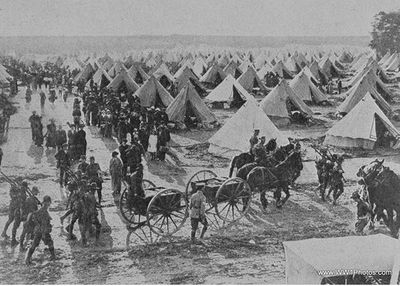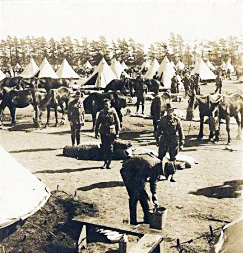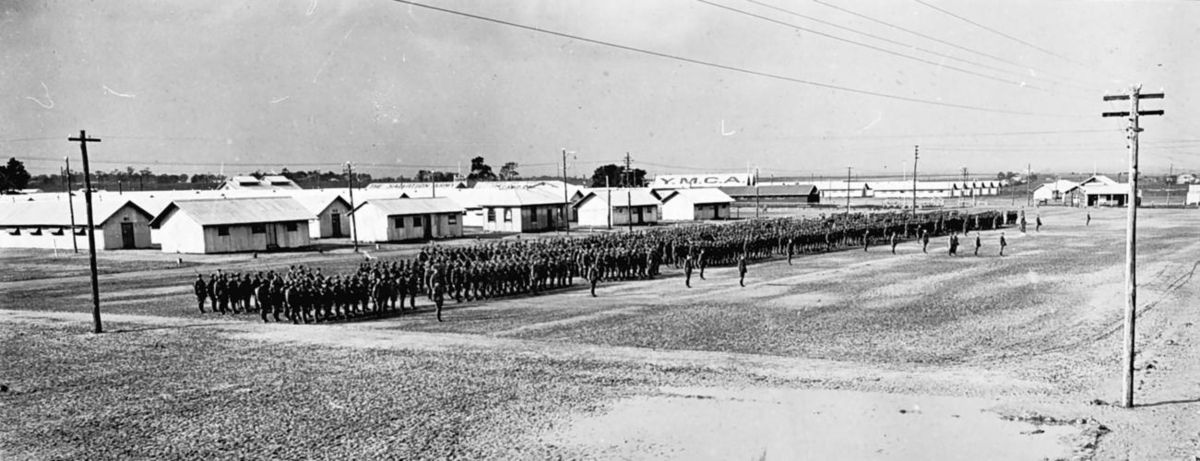Difference between revisions of "Broadmeadows camp"
From Our Contribution
(→Soldiers) |
(→Soldiers) |
||
| Line 64: | Line 64: | ||
* † [[Rupert Arthur Kent Goodchild]] ?? Oct - 21 Dec 1914 | * † [[Rupert Arthur Kent Goodchild]] ?? Oct - 21 Dec 1914 | ||
* [[John Richard (Jack) Hall]] 28 Nov - 22 Dec 1914 | * [[John Richard (Jack) Hall]] 28 Nov - 22 Dec 1914 | ||
| − | * [[William (Bill) Hart]] 28 Nov - 21 Dec 1914 | + | * [[William John (Bill) Hart]] 28 Nov - 21 Dec 1914 |
* [[James Kirk]] 28 Nov - 22 Dec 1914 | * [[James Kirk]] 28 Nov - 22 Dec 1914 | ||
* † [[James Edward Laugher]] 28 Nov - 22 Dec 1914 | * † [[James Edward Laugher]] 28 Nov - 22 Dec 1914 | ||
Latest revision as of 20:26, 1 November 2023
 Early tent city | |
 View of the horse lines | |
Contents
Remarks
Alongside other Australians, Victorians rushed to enlist when recruiting commenced. The first recruits camped in tents in the courtyard of the Victoria Barracks while others were put up at the Showgrounds or at racecourses. A patriotic Victorian, R.G. Wilson, offered to house a military camp on his land at Broadmeadows and the government quickly accepted. (Later the government bought the land). Broadmeadows camp was close to a railway line, was flat and could be well-watered. There was plenty of room for a large number of soldiers.
On 19 August 1914, two weeks and one day after the announcement of war, 2,500 men set off for Broadmeadows from central Melbourne. Crowds lined the streets as these men in mufti, some clutching Gladstone bags and some carrying neat parcels, walked from Victoria Barracks to the camp.
Leaving the Barracks at 9.30am they reached the camp at 5pm where they found ‘a green plain, rather high and windswept, with rows of pine trees and an old homestead.’ ‘A hard road made [for] many sore feet,’ a marcher reported.
Charles Bean referred to Broadmeadows as:"Broadmeadows Camp was 10 miles from Melbourne, and officially every soldier was supposed to be in his blankets by 9.30 pm. As a matter of fact, every night both men and officers thronged the streets and cafes in Melbourne until the small hours of the morning.”[1]
Broadmeadows camp became the central training point for those allocated to artillery units in addition to training for signallers. As such, many West Australian enlistees spent time at Broadmeadows receiving Corp specific training after their initial induction at Blackboy Hill camp in Perth.
Soldiers
- † Herbert Ernest Baldwin
- † Frank Ball ?? Oct - 21 Dec 1914
- † Edward James Bell 28 Nov - 21 Dec 1914
- Harry Douglas Butcher 14 Jan - 28 Feb 1918
- Ernest Camp 8 Aug - 29 Oct 1917
- James Candish 12 Feb - 19 May 1916
- Alfred Warburton Chapman (Snr)
- Claude Francis Cooper 1 Jan - 2 Jul 1916
- † Rupert Arthur Kent Goodchild ?? Oct - 21 Dec 1914
- John Richard (Jack) Hall 28 Nov - 22 Dec 1914
- William John (Bill) Hart 28 Nov - 21 Dec 1914
- James Kirk 28 Nov - 22 Dec 1914
- † James Edward Laugher 28 Nov - 22 Dec 1914
- George William Liddington 28 Nov - 22 Dec 1914
- George Henry Martin MM MID 28 Nov - 22 Dec 1914
- Bruce Leslie Logan
- Dugald Thomas Main August to October 1917
- Edward Dudley Mann
- Lewis George Martin
- Sydney Clarence Owen Matthews
- Patrick O'Connell McKenna 28 Nov - 22 Dec 1914
- Albert Hughes Michel ?? Dec 1915 - 3 May 1916
- Edward Mordan Neale
- Michael Dennis O'Rourke
- William Harold Raynor
- † William Edward Reed 28 Nov - 22 Dec 1914
- Frederick William Scott
- Ellis Shackleton
- Francis Joseph (Frank) Steffan
- John Edward Thomson 5 Oct - 8 Nov 1915
- Peter Grant Watt 9 Sep - 29 Oct 1917
- † Harold Watts 28 Nov - 22 Dec 1914
- Aubrey Jesse Whittington MM 28 Nov - 22 Dec 1914
- George Young 28 Nov - 22 Dec 1914
Remained in Australia

A Battalion on parade https://collections.museumvictoria.com.au/items/773049
Notes
- ↑ Official History of Australia in the War of 1914-1918 Vol 1. page 92. C.E.W. Bean. University of Queensland Press Edition